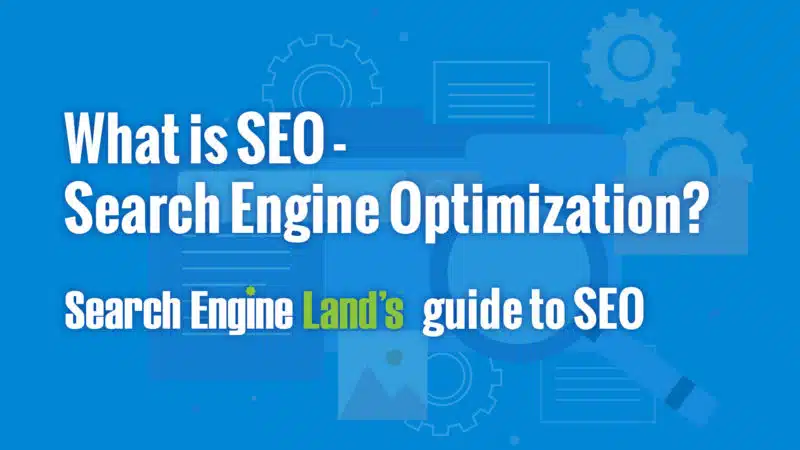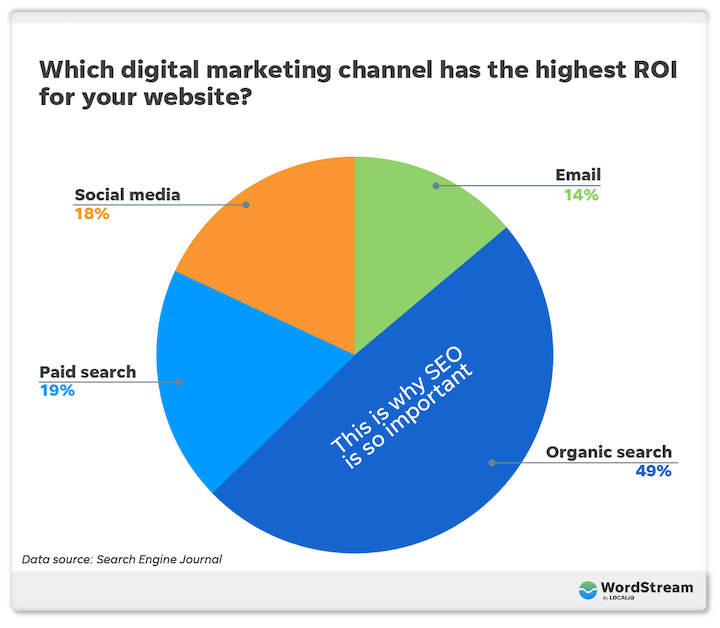Use Search Engine Optimization (SEO) by optimizing your website’s content and structure. Focus on keywords, meta tags, and quality backlinks.
SEO helps your website rank higher on search engines like Google. This increased visibility can drive more organic traffic to your site. Start by researching relevant keywords that your target audience searches for. Integrate these keywords naturally into your content, titles, and meta descriptions.
High-quality backlinks from reputable sites also boost your SEO. Ensure your website is mobile-friendly and has fast loading times. Regularly update your content to keep it fresh and relevant. User engagement metrics like time spent on the page and low bounce rates positively impact SEO. Following these practices can significantly improve your website’s search engine ranking and online presence.

Keyword Research
Keyword research is the backbone of any successful SEO strategy. Finding the right keywords helps your website rank higher on search engines. This ensures more visibility and attracts the right audience. Let’s dive into how to perform effective keyword research.
Finding The Right Keywords
Finding the right keywords requires understanding your audience. Know what terms they use to search for your services. Start by brainstorming a list of potential keywords. Consider what problems your product or service solves. Think about the phrases your target audience might use. Your goal is to identify keywords with high search volume and low competition.
Utilize these steps for finding effective keywords:
- List all the topics related to your business.
- Break down these topics into specific keyword phrases.
- Consider the intent behind each keyword.
- Analyze your competitors’ keywords.
Tools For Keyword Research
Several tools can help you find the best keywords for your website. These tools offer insights into search volume, competition, and trends. Here are some popular keyword research tools:
- Google Keyword Planner: Free tool by Google. Provides search volume and forecasts for keywords.
- Ahrefs: Paid tool. Offers comprehensive keyword analysis and competitive insights.
- SEMrush: Another paid tool. Known for its detailed keyword data and competitor analysis.
- Ubersuggest: Free and paid options. Provides keyword suggestions and SEO metrics.
- KeywordTool.io: Generates keywords from Google autocomplete. Useful for long-tail keywords.
Using these tools, you can identify the most valuable keywords for your website. Here’s a simple table comparing some features of these tools:
| Tool | Free/Paid | Main Features |
|---|---|---|
| Google Keyword Planner | Free | Search volume, forecasts |
| Ahrefs | Paid | Keyword analysis, competitive insights |
| SEMrush | Paid | Detailed keyword data, competitor analysis |
| Ubersuggest | Free/Paid | Keyword suggestions, SEO metrics |
| KeywordTool.io | Free/Paid | Google autocomplete keywords, long-tail keywords |
Effective keyword research can significantly boost your SEO efforts. It helps you target the right audience and improve your website’s visibility. Use the right tools and strategies to find the best keywords for your website.
On-page Optimization
On-page optimization is crucial for improving your website’s search engine rankings. It involves tweaking individual pages to make them more search-engine-friendly. This process enhances your site’s visibility, driving more organic traffic.
Optimizing Content
Optimized content is key to good SEO. Use relevant keywords throughout your text. Ensure the keywords are naturally integrated. Avoid keyword stuffing, as it can hurt your rankings. Focus on creating high-quality, informative content.
Use header tags (
,
,
) to structure your content. This helps search engines understand your content better. It also makes your content easier to read. A well-structured page can improve user experience.
Add internal links to other pages on your site. This helps search engines crawl your site more effectively. It also keeps visitors on your site longer. Use alt text for images. This helps search engines index your images and improves accessibility.
Meta Tags And Descriptions
Meta tags and descriptions play a vital role in SEO. They provide search engines with information about your page. Use relevant keywords in your meta tags. Make sure your meta descriptions are engaging and informative.
Here is a table to illustrate the key meta tags and their importance:
| Meta Tag | Purpose |
|---|---|
| Defines the title of the page. Appears in search results. |
| Provides a brief summary of the page’s content. |
| Lists relevant keywords for the page. |
Keep your title tags concise and relevant. Aim for 50-60 characters. Your meta description should be around 150-160 characters. These elements can significantly impact your click-through rates.
Ensure each page has a unique title and meta description. This helps avoid duplicate content issues. It also makes each page more relevant to specific searches.
Technical Seo
Technical SEO is a vital part of your website’s success. It involves optimizing the backend of your site. This ensures search engines can crawl, index, and rank your site effectively. Let’s explore some key aspects of Technical SEO.
Site Speed
Site speed is crucial for both user experience and search engine ranking. A fast-loading site keeps users engaged. It also signals to search engines that your site is high quality. To improve site speed:
- Compress images to reduce their file size.
- Enable browser caching to speed up repeat visits.
- Minimize HTTP requests by combining files.
- Use a Content Delivery Network (CDN) to serve content faster.
Tools like Google PageSpeed Insights can help you analyze and improve your site’s speed.
Mobile Friendliness
Mobile friendliness is essential as more people use mobile devices to browse the web. A mobile-friendly site improves user experience and boosts your search engine ranking. To ensure your site is mobile-friendly:
- Use responsive web design to adapt to different screen sizes.
- Ensure buttons and links are large enough for mobile users.
- Optimize images to load quickly on mobile devices.
- Test your site on various mobile devices and browsers.
Google’s Mobile-Friendly Test tool can help you check your site’s mobile compatibility.

Credit: searchengineland.com
Link Building Strategies
Link building is essential for effective Search Engine Optimization (SEO). It helps improve your website’s visibility and authority. There are two primary strategies: internal links and external links. Each strategy plays a unique role in enhancing your SEO efforts. Let’s delve into how you can use these methods to boost your website’s performance.
Internal Links
Internal links connect different pages on your website. They help users navigate and find relevant information. Internal links also distribute page authority across your site.
For example, you can link from a blog post to a product page. This helps users explore more content and keeps them engaged. Use descriptive anchor text for your internal links. It informs users and search engines about the linked page.
Here are some tips for effective internal linking:
- Use keyword-rich anchor text.
- Link to relevant pages with high authority.
- Avoid excessive linking; keep it natural.
- Update old content with new internal links.
External Links
External links point from your website to other websites. They provide value by linking to authoritative sources. External links can improve your credibility and SEO.
For example, link to a reputable industry study in your blog post. This adds value to your content and shows you’ve done your research. Use external links sparingly and ensure they are relevant.
Here are some best practices for external linking:
- Link to high-quality, authoritative websites.
- Ensure the linked content is relevant to your topic.
- Use nofollow tags for sponsored or affiliate links.
- Check and update broken external links regularly.
By using both internal and external links effectively, you can enhance your website’s SEO. Internal links improve user experience and distribute authority. External links build credibility and provide value.
Content Creation
Creating engaging content is a vital part of Search Engine Optimization (SEO). Great content attracts visitors and boosts your search engine rankings. This section dives into the essentials of content creation for SEO success.
Quality Content
Quality content is the cornerstone of SEO. Search engines prioritize well-written, informative, and engaging content. Aim for content that answers questions and solves problems. Use clear and simple language.
Here are some tips for creating quality content:
- Research keywords relevant to your topic.
- Write original and unique content.
- Use headings and subheadings to structure your text.
- Incorporate images, videos, and infographics.
- Ensure your content is free of grammar and spelling errors.
Content Types
Different types of content can attract different audiences. Mixing various content types keeps your site engaging. Here are some popular content types:
| Content Type | Description |
|---|---|
| Blog Posts | Regular updates on topics related to your niche. |
| How-To Guides | Step-by-step instructions to help users solve problems. |
| Infographics | Visual representations of data or concepts. |
| Videos | Engaging content in a visual format. |
| Case Studies | In-depth analysis of specific instances. |
To maximize the impact, consider these best practices:
- Identify your audience and their needs.
- Create a content calendar to plan your posts.
- Promote your content on social media.
- Update old content to keep it relevant.
- Monitor performance using analytics tools.
By focusing on quality content and diverse content types, you can enhance your website’s SEO and user experience.

Credit: www.wordstream.com
Monitoring And Analytics
Monitoring and analytics are vital components of effective Search Engine Optimization (SEO). They help you track your website’s performance and make necessary adjustments. These tools let you see what works and what needs improvement.
Tracking Performance
Tracking performance is the first step in monitoring your SEO efforts. Use tools like Google Analytics and Google Search Console to gather data. These tools provide insights into website traffic, user behavior, and keyword performance.
- Google Analytics: Tracks visitor data and behavior.
- Google Search Console: Monitors search performance and indexing issues.
Set up custom reports to get detailed insights. Look at metrics such as:
| Metric | Description |
|---|---|
| Organic Traffic | Number of visitors from search engines. |
| Bounce Rate | Percentage of visitors who leave after viewing one page. |
| Average Session Duration | Average time visitors spend on your site. |
| Keyword Rankings | Positions of your keywords in search results. |
These metrics help you understand how your site performs in search results. Adjust your strategies based on this data.
Adjusting Strategies
Adjusting strategies is crucial for ongoing SEO success. Use the data you collect to refine your approach. Focus on areas that need improvement.
- Identify Weak Points: Look for high bounce rates or low average session durations.
- Improve Content: Create high-quality, relevant content for your audience.
- Optimize Keywords: Target long-tail keywords for better rankings.
- Enhance User Experience: Make your site mobile-friendly and fast-loading.
Continually test and tweak your strategies. SEO is an ongoing process. Keep monitoring and adjusting for the best results.
Frequently Asked Questions
How Do I Use Seo On My Website?
Optimize your website by using relevant keywords, creating high-quality content, improving page speed, using meta tags, and building backlinks.
How To Optimize A Website For Search Engine?
Optimize your website by using relevant keywords, improving page speed, creating quality content, ensuring mobile-friendliness, and building backlinks.
How To Do Seo For Beginners?
Start with keyword research to find relevant terms. Optimize your website’s title, meta descriptions, and headers. Create high-quality, engaging content. Build backlinks from reputable sites. Monitor your SEO performance using tools like Google Analytics.
Can You Improve Seo For Free?
Yes, you can improve SEO for free. Utilize keyword research, optimize content, improve site speed, and build backlinks.
What Is Seo?
SEO stands for Search Engine Optimization. It improves your website’s visibility on search engines like Google.
Conclusion
Mastering SEO can significantly boost your website’s visibility and traffic. Focus on keyword research and quality content. Regularly update your site and utilize backlinks. Monitor your performance with analytics tools. Implement these strategies to see your website climb search engine rankings and attract more visitors.



Hey people!!!!!
Good mood and good luck to everyone!!!!!
Thanks